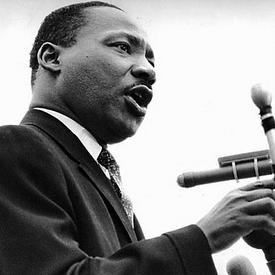 Dr. Martin Luther King Jr.
Dr. Martin Luther King Jr. The Mountaintop’s depiction of Dr. King is a blend of fact and authorial invention. As Hall explained in a 2013 interview with NPR, “This play is highly fictionalized, almost anti-historical, even though it starts on April 3, 1968.” King was indeed lodging in Room 306 at the Lorraine Motel that evening, having flown to Tennessee to support black sanitation workers on strike. What transpires in Room 306 in Hall’s script, however, is her fantasy about what his state of mind might have been. The story begins when King returns to the room, having just delivered his prophetic “I’ve Been to the Mountaintop” address at Mason Temple. He’s tired, stressed, and craving a cigarette. Welcome distraction arrives in the form of Camae, a young maid who brings him coffee and a newspaper. With no small amount of flirting, he convinces her to keep him company for a while. Initially she’s intimidated by his celebrity, but as the night wears on, she proves more than a match for the venerable “Preacher Kang.” She questions the efficacy of his emphasis on non-violent methods of protest. She calls him out for having smelly feet. And when he jumps at the sounds of the storm raging outside, or clutches at his overburdened heart in a moment of panic, she’s a source of solace.
A Dr. King who smokes and drinks whiskey? A Dr. King who’s faced bomb threats and bullets and police brutality, but is afraid of thunder? It might seem hard to believe—shocking, even. But in pulling him off his pedestal, Katori Hall is after something much deeper. She describes her portrayal as “a very human approach to Dr. King.” According to Hall, it’s easy to look at a figure like Martin Luther King, Jr. and forget that, like us, he was once flesh and blood. Our history books have elevated him to near-sainthood, making his myriad accomplishments seem superhuman. Seeing King light up a cigarette or notice an attractive woman or reach out for reassurance brings him back down to earth. He becomes someone with whom we can empathize, because he’s fallible and vulnerable. And all that he’s achieved becomes even more impressive, because we realize it was the work of a man, not a myth.
Exploring King’s humanity is also a project of personal significance for Hall. An African-American woman from Memphis, she grew up literally surrounded by the legacy of the Civil Rights Movement—and aware that, for all the Movement’s successes, as a society we still have farther to go in the march toward true equality. For example, despite the substantial progress King made with desegregation in the legal system, Hall’s was the only black family in their neighborhood. “I had to contend with people hating me for no reason at all… just due to our unfortunate history as Americans,” she has said. “I just had to figure out, where does this come from? What are we fighting for?” In The Mountaintop, we watch King ask himself the same questions and admit to Camae that he feels like a failure. Hall’s digging into King’s doubts illustrates a difficult answer: meaningful change usually can’t be achieved quickly or without struggle, and there’s always more to be done. In his “I’ve Been to the Mountaintop” speech, King envisioned a better future almost within reach—but in Hall’s play, no matter how hard he fights the fact of his imminent death, he won’t live to see his dream become reality. Now, Hall implies, it’s our turn to fight for the better future that King foresaw.
It’s no wonder that The Mountaintop has resonated with audiences both in America and abroad. Upon its 2009 London premiere, it won the prestigious Olivier Award for Best New Play. In 2011 it was produced on Broadway, starring Samuel L. Jackson and Angela Bassett, and has spread to countless other stages across the country. With heart, humor, and theatrical spectacle, Katori Hall’s luminous play reminds us that if King could accomplish so much despite his many foibles, than maybe in our own small ways, we can too. As Hall puts it, “Showing the humanity in our heroes allows us to see the hero in ourselves.”
—Hannah Rae Montgomery
Reprinted with permission by Actors Theatre of Louisville



